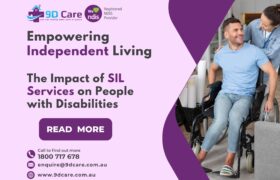- Be Your Personal Best
Warning: foreach() argument must be of type array|object, string given in /home/u637612890/domains/9dcare.com.au/public_html/wp-content/themes/9dcare-theme/inc/custom-functions.php on line 503
Understanding Supported Independent Living (SIL)
Supported Independent Living (SIL) is personal support for those who require significant assistance throughout the day, seven days a week. It is one of the different types of home and living supports funded by the NDIS.
The process to get Supported Independent Living funding is different compared to other NDIS supports.
Today, we have collated this guide for you to get the best expert advice from our team and know how 9D Care, a NDIS registered provider assists individuals with disability to deeply understand the overall picture of Supported Independent Living.
What is Supported Independent Living?
Supported Independent Living (SIL) is support for participants with higher support needs. This means those who require personal support or supervision seven days a week and up to 24 hours a day.
If you have higher support needs, support workers can assist you with household tasks such as grocery shopping or cooking your meals, to help you build your skills and live as independently as possible. They can also assist you with accessing social activities outside the home.
This support is essential for people with disability, who may not be able to access this level of assistance from family members and other informal support networks. SIL homes are purpose-built for participants.
Most SIL participants live with other participants who also have SIL funding, or they move into specially designed and furnished SIL homes. As SIL participants are most likely to live with other people with similar needs, SIL support is also a way for them to live an independent life while forming a bond with the others.
What is the difference between SDA and SIL?
While Specialist Disability Accommodation (SDA) refers to the purpose-built accommodation dwelling itself, SIL or supported independent living is the support service you might require while living in your SDA. SIL is not dependent on where you live. You can receive SIL support in your own home, a private rental or a SIL home shared with others.
If in addition to SIL, if you are also funded for Specialist Disability Accommodation, you’ll be able to move into an SDA home or apartment. SDA homes are designed specifically for people with very high support needs.
How does SIL funding work?
If you have supported independent living funding included in your NDIS plan, you can use it to pay support workers or professional caretakers. They can visit or stay overnight and assist with various daily tasks, such as:
- Personal care tasks
- Accessing the community for recreational or educational activities
- Cleaning and other household tasks
- Transport support for appointments.
- Developing social skills
- Administration of medication
- Shopping, cooking, and meal preparation.
This is not an exhaustive list. You can discuss your needs with a team member at 9D Care. We will create a document for you called “Roster of Care”.
Can I use SIL funding to pay for rent and groceries?
No. Supported independent living does not include the daily living costs that are not related to your disability or your disability support needs. This means you can’t use SIL funding to pay for rent, groceries, or utilities such as gas or electric bills.
How do I get SIL funding in my plan?
If you’re new to the NDIS, you’ll first have a conversation with your NDIA planner at a planning meeting to discuss your current situation, home and living goals. You may be asked to complete a Home and Living Supports Request Form.
Your NDIA planner may also talk to people who are close to you and who have an insight into your daily needs, such as your family members and caregivers.
This helps the NDIA understand your current situation, your home and living goals, helping them to decide whether SIL is your best option. If the NDIA decides that SIL is the best funding option for you, the next exciting step is to choose your SIL service provider.
Finding the right SIL provider
Most people who receive SIL also receive funding for Support Coordination. Your Support Coordinator can help arrange appointments with allied health providers who can conduct a full assessment of your needs.
Most importantly, they can assist in finding the most suitable SIL provider to help you achieve your goals. At 9D Care, we have our support coordinators who can guide you through this process. We also manage and screen the support workers who work in the home. We can also plan for transport for social activities or other events out in the community.
While it is possible to receive SIL support in your own home, you will likely be receiving SIL in a shared home with other SIL participants.
Roster of Care
Once you’ve made your choice, we will work closely with you to create a document called “Roster of Care” or RoC.
This in essence is a quote of our services. A roster of care will include information such as:
- a description of the property where you’ll receive SIL support.
- the types of support you’ll be able to receive.
- the number of hours of support in an ordinary week
- the ratio of support, or how many disability support workers will provide your support, and how many participants you’ll share this support with the outcomes you want to achieve.
After you’ve signed off on the RoC, we can provide you and your Support Coordinator with this document to submit to the NDIA. We can also submit the RoC directly to the NDIA on your behalf. The NDIA will look over the RoC and other supporting documents and approve the budget for your SIL funding.
You can then pack up, move in, and start your journey towards independent living! In most cases, the NDIA will liaise directly with us as your chosen provider, giving you time to focus on developing your life skills and reaching your goals.
Need help finding a SIL provider?
If you require support for daily tasks, our shared living accommodations will make you feel at home.
We have Supported Independent Living Homes in various suburbs in Melbourne. Our SIL homes allow you to form friendships, connect with the local community and live independently – all while feeling confident you have the compassionate support of 9D Care Carers.
Move in with us and start your journey towards a rich and independent life! Call us on 1800 717 678 or email enquire@9dcare.com.au
“Supported Independent Living is Your Pathway to a Fulfilled and Confident Life.”
Navigating the National Disability Insurance Scheme (NDIS) can be a complex journey, especially when addressing unique and individual needs. But.
The importance of inclusion in the workplace is significant for several reasons. It allows for there to be a large.
At 9D Care believes in providing unparalleled personal care through their comprehensive and innovative services. And so today, we have.
The heart of our mission lies in the experiences and invaluable insights provided by NDIS participants. Their candid feedback has.
In our previous blog post, you must have read about how to apply and qualify to be an active participant.
Supported Independent Living (SIL) services play a crucial role in helping people with disabilities live more independently and confidently. These.





